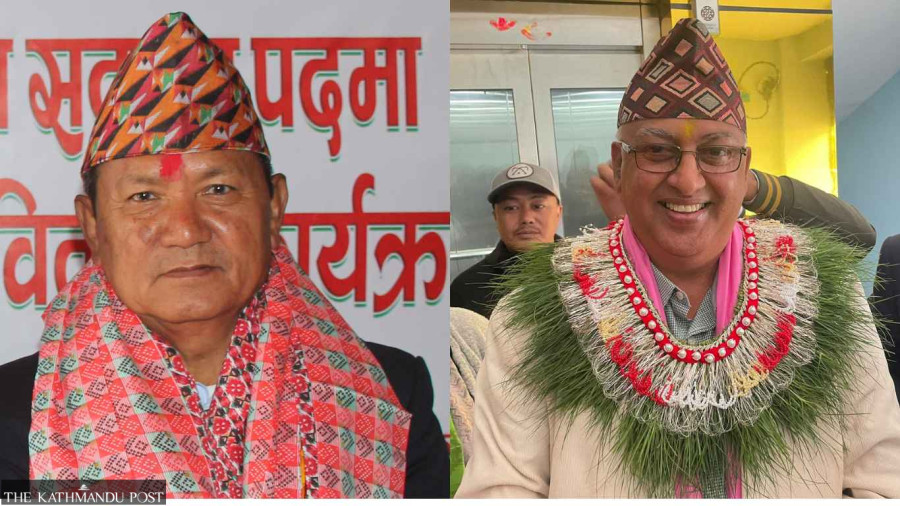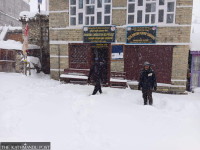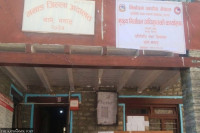Gandaki Province
UML is losing ground in Gandaki Province. Congress making gains
In 2017, UML alone won 13 lower house seats from Gandaki, but this time its tally has reduced to just five.
Lal Prasad Sharma
The Nepali Congress occupied only one seat in the House of Representatives under the first-past-the-post electoral system from Gandaki Province during the federal and provincial polls in 2017. Only Shashank Koirala was elected from Nawalparasi (East)-1.
In the elections held on Sunday, the Congress has made significant gains in Gandaki. Results for 17 of the total 18 electoral constituencies in the province had been declared by Friday. The Congress emerged victorious in nine constituencies.
Vote counting in Syangja-2 has yet to begin amid the CPN-UML demanding reelection in four polling centres of Chapakot Municipality claiming that Congress workers rigged the vote there. Two political heavyweights—Congress Vice-president Dhanraj Gurung and UML Secretary Padma Aryal—are contesting the House seat.
In 2017, the UML alone won 13 seats in Gandaki. The CPN (Maoist Centre) bagged three House seats while the then Naya Shakti Party led by Baburam Bhattarai won one.
This election, the UML has won only five seats so far. UML candidates Man Bahadur Gurung, Bidhya Bhattarai and Damodar Paudel have been elected from Kaski constituencies 1, 2 and 3, respectively. Similarly, Prithvi Subba Gurung won the vote from Lamjung and Padam Giri emerged victorious from Parbat district.
The UML leadership argues that the party lost some House seats under the fist-past-the-post category due to the electoral alliance. The UML had contested the federal election in 2017 by forging electoral alliance with the Maoists. “We lost some of the seats as the UML solely contested the election against the common candidates of the five-party alliance,” said Nabaraj Sharma, the UML provincial chief in Gandaki Province.
“Our party is yet to analyse the poll results in detail. The subordinate party units are instructed to submit reports in this regard. The party will find out the problems that caused the defeat of the party candidates in the elections,” said Sharma.
Congress senior leader Ram Chandra Paudel has been elected to the HoR from Tanahun-1 for the sixth time. He was defeated by the then UML candidate Krishna Kumar Shrestha in 2017. Shrestha has been elected to the federal parliament from Bara Constituency No 4. Likewise, Congress central member Shankar Bhandari has been elected from Tanahun-2 by defeating UML candidate Kiran Gurung.
In Nawalparasi (East), Congress central member Koirala has been re-elected from constituency No 1 while Bishnu Kumar Karki has won the HoR seat from constituency No 2. Their nearest rivals were the UML candidates.
Likewise, Congress candidate Raju Thapa emerged victorious from Syangja-1 by defeating the erstwhile member of federal parliament and UML leader Narayan Marasini. Congress candidates Yogesh Gauchan in Mustang and Tek Bahadur Gurung in Manang have been elected for the federal parliament while Rajendra Bajagain emerged victorious from Gorkha-1.
The Congress, the Maoist Centre, the Rastriya Janamorcha and the CPN (Unified Socialist) had an electoral alliance to contest the November 20 elections in Gandaki Province. Maoist Centre chair Pushpa Kamal Dahal has been elected to HoR from Gorkha-2 while another party leader Devendra Paudel booked the HoR seat from Baglung-2.
Octogenarian Chitra Bahadur KC, the chairman of the Rastriya Janamorcha, has been elected to the HoR from Baglung-3 for his third term. KC—who is a vocal critic of federalism, the citizenship bill and the Millennium Challenge Corporation agreement with the US government—has won the election with the support of the Congress, the Maoist and the CPN (Unified Socialist). “I had supported the Oli-led government. Our party had to make an electoral alliance with the Congress and other parties as Oli breached the constitution,” said KC.




 13.12°C Kathmandu
13.12°C Kathmandu.jpg)











